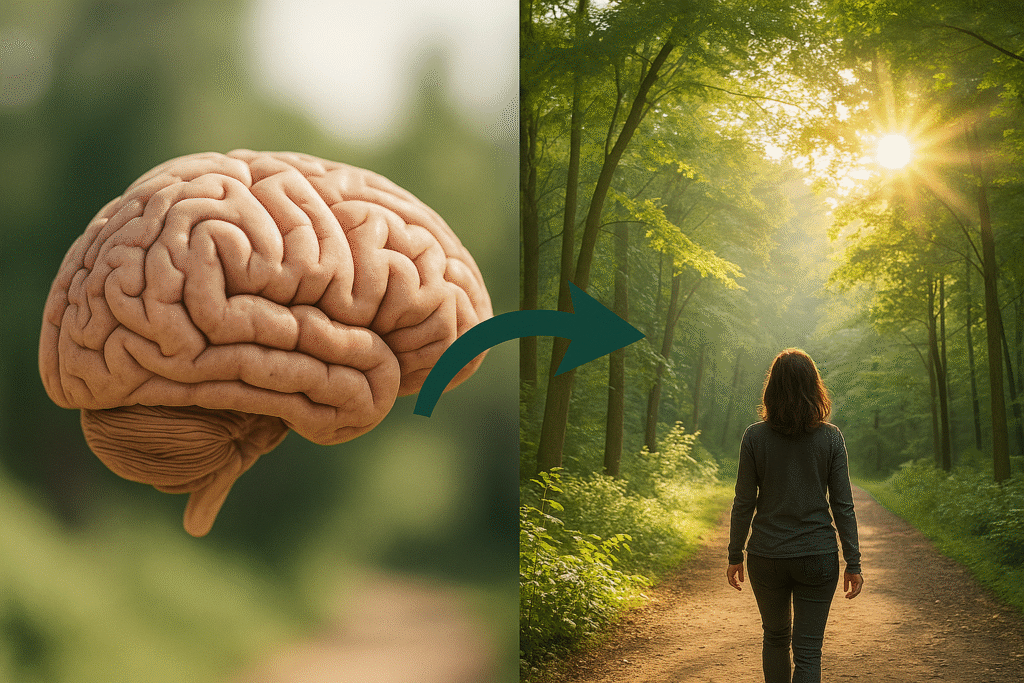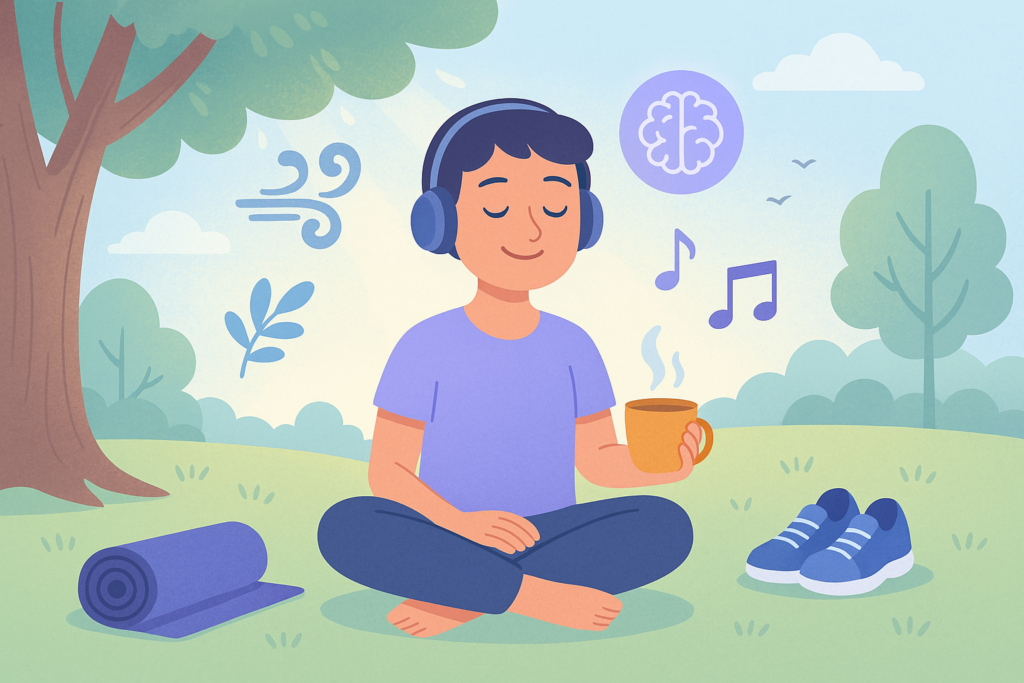In today’s fast-paced, urbanized world, mental health challenges are on the rise. Stress, anxiety, and burnout have become common, especially as many people spend the majority of their time indoors, surrounded by screens and disconnected from the natural world. But what if one of the most effective remedies for improving mental well-being doesn’t come from a pill—but from the outdoors?
The impact of nature on mental health is gaining increasing attention from scientists, psychologists, and wellness experts alike. Whether it’s walking through a forest, sitting by a lake, or simply being exposed to greenery, engaging with nature has been shown to reduce stress, elevate mood, and enhance cognitive function. In this article, we’ll explore how and why nature can be a powerful tool for mental restoration—and how you can incorporate it into your everyday life.
How Nature Affects the Brain and Nervous System

Modern neuroscience is revealing just how deeply nature impacts the human brain and nervous system. When we step into a forest, park, or garden, we’re not just changing our environment—we’re altering our physiology.
The Role of Green Spaces in Reducing Cortisol and Stress Hormones
Studies have shown that time spent in green spaces significantly reduces levels of cortisol, the body’s primary stress hormone. Natural environments activate the parasympathetic nervous system—our “rest and digest” mode—which slows the heart rate, reduces blood pressure, and induces a sense of calm. Even looking at images of nature can create a measurable drop in physiological stress markers.
How Natural Environments Influence Brain Activity and Neuroplasticity
Functional MRI scans reveal that spending time in nature decreases activity in the prefrontal cortex, the region associated with rumination and negative thought patterns. This neural shift may explain why nature enhances mood and reduces anxiety. Nature exposure also promotes neuroplasticity—the brain’s ability to form new connections—especially when movement (like walking or hiking) is involved, making it a cognitive and emotional reset for the mind.
💡 Quick Tip: Start your day with a short walk in a nearby green space—even 10 minutes of exposure can regulate your nervous system and set a calmer tone for the day.
Nature as a Therapy for Anxiety, Depression, and Burnout

Beyond its physiological effects, nature is now being explored as a complementary therapy for mental health conditions like anxiety, depression, and burnout. It offers a non-invasive, accessible, and scientifically supported tool for emotional recovery.
Ecotherapy and Forest Bathing (Shinrin-Yoku)
Ecotherapy, also known as nature therapy, involves guided experiences in natural settings to support emotional healing. One popular method is Shinrin-Yoku, or forest bathing—a Japanese practice that encourages slow, mindful walks in the woods, engaging all five senses. Research has shown that forest bathing can reduce symptoms of anxiety, lower heart rate and blood pressure, and increase feelings of happiness and vitality.
Clinical Evidence on Nature’s Role in Treating Mood Disorders
Growing bodies of research indicate that exposure to nature may reduce symptoms of depression by improving emotional regulation, increasing serotonin production, and enhancing social connection. In therapeutic settings, green environments help patients feel safer, more grounded, and more open to healing. Some clinics now even include “green prescriptions”—structured time outdoors as part of their treatment plans.
✅ Expert Summary: Nature is more than just a relaxing escape—it’s a scientifically backed tool that therapists and physicians are now integrating into mental health care strategies.
The Cognitive Benefits of Nature Exposure

Nature does more than calm our emotions—it also sharpens our minds. Time in natural environments has been shown to improve attention span, creativity, and memory, offering measurable cognitive advantages in both children and adults.
Nature’s Effect on Attention Restoration and Mental Clarity
According to Attention Restoration Theory (ART), the human brain becomes fatigued by constant stimulation—especially from urban environments and digital screens. Nature provides “soft fascination”—a gentle, effortless form of attention that allows the brain to recover. Just 20 minutes in a park has been shown to improve focus and working memory, making nature a powerful antidote to cognitive overload.
Boosting Creativity and Problem-Solving in Natural Settings
Spending time outdoors has also been linked to improved creative thinking and problem-solving. One study by psychologists found that hikers who spent four days in nature without technology scored 50% higher on creative problem-solving tests than those who stayed connected to devices. The combination of movement, fresh air, and sensory stimulation seems to unlock new neural pathways for insight and innovation.
📌 Did You Know? Regular walks in nature can improve your memory and attention as much as caffeine—without the crash.
Urban Design and Access to Nature: Mental Health in Cities

In an increasingly urbanized world, access to natural spaces is becoming a public health concern. Urban design can either enhance or restrict opportunities for residents to benefit from nature, directly influencing mental health outcomes.
Green Infrastructure: Parks, Trails, and Public Spaces
Cities with well-integrated green infrastructure—parks, walking trails, rooftop gardens, and tree-lined streets—offer residents vital mental health benefits. These areas serve as stress-relief zones, promote social interaction, and offer space for physical activity, which is closely tied to emotional regulation. Even short interactions with greenery during commutes or lunch breaks can provide psychological relief.
Socioeconomic Disparities in Nature Access and Their Mental Health Impact
Unfortunately, access to nature is not distributed equally. Low-income neighborhoods are often underserved when it comes to green space availability and maintenance. This inequality can exacerbate mental health disparities, leaving vulnerable populations with fewer tools for emotional resilience. Addressing this gap through urban planning, policy, and community involvement is critical for promoting equity in mental well-being.
💡 Quick Tip: If you live in a dense urban area, seek out micro-greenspaces—like small plazas, rooftop gardens, or even indoor plant-filled cafes—to recharge your mind when large parks aren’t available.
The Impact of Nature on Mental Health: What Science Says
Numerous studies have confirmed that regular exposure to nature leads to measurable improvements in mental health. From reducing cortisol levels to improving emotional regulation and cognitive performance, the impact of nature on mental health is now backed by science across disciplines like psychology, neuroscience, and public health.
Practical Ways to Reconnect with Nature for Better Mental Health

Knowing that nature supports mental well-being is one thing—making time for it is another. Fortunately, even small, intentional moments with nature can yield significant psychological benefits. You don’t need a forest retreat to feel the impact—just a consistent effort to reconnect with the natural world.
Daily Habits to Integrate Nature into a Busy Lifestyle
Start by building nature into your daily routine. Open your windows first thing in the morning, take your lunch break outside, or walk part of your commute through a park or tree-lined street. At home, incorporate indoor plants, natural light, and even nature sounds or images to create a calming atmosphere that supports your mental health without requiring extra time.
Using Digital Detox + Outdoor Time to Boost Mental Resilience
One of the most effective ways to reconnect with nature is to pair it with a digital detox. Even 30 minutes away from screens while outdoors can lower mental fatigue, reduce anxiety, and improve sleep quality. Weekend hikes, gardening, or simply leaving your phone behind during a walk can enhance mindfulness, present-moment awareness, and mental clarity—all essential to managing stress in a digital-heavy world.
💡 Quick Tip: Try scheduling a weekly “green appointment”—a set time to disconnect and go outside. Treat it like a meeting with your mind and make it non-negotiable.
🌿 Conclusion: Embracing Nature for Mental Well-Being
In our increasingly urbanized and digitally connected world, reconnecting with nature offers a powerful, evidence-based approach to enhancing mental health. From reducing stress hormones and alleviating symptoms of anxiety and depression to boosting cognitive functions like attention and creativity, the benefits of nature are profound and multifaceted.
Integrating nature into daily life doesn’t require grand gestures; simple actions like a walk in the park, tending to indoor plants, or taking short breaks outdoors can make a significant difference. Moreover, urban planning that prioritizes green spaces can play a crucial role in promoting mental well-being on a community level.
For those interested in exploring more about natural approaches to mental health, consider reading our article on the 10 Best Exercises for Rapid Weight Loss, which includes activities that can be performed outdoors to combine physical and mental health benefits.
Additionally, our review of Mitolyn discusses a supplement designed to support mitochondrial function, potentially enhancing energy levels and overall well-being.
To further understand the relationship between nature and mental health, you may find these resources insightful:
Embracing nature’s therapeutic potential can be a transformative step toward improved mental health and a more balanced life.



